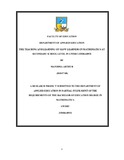Please use this identifier to cite or link to this item:
https://cris.library.msu.ac.zw//handle/11408/2294| Title: | The teaching and learning of slow learners in mathematics at Secondary School level in Gweru Zimbabwe. | Authors: | Mandima, Arthur | Keywords: | Mathematics education Slow learners and mathematics |
Issue Date: | 2015 | Publisher: | Midlands State University | Abstract: | This study focused on the teaching and learning of slow learners in mathematics at secondary school level in secondary and high schools in Gweru Urban District. The researcher's main objective was to find out how slow learners in mathematics are being assisted at secondary school levels, the challenges, if any, which are being faced by the teachers in assisting these slow learners as well as the slow learners' perspectives towards the assistance they are being given by their mathematics teachers. A descriptive survey was used to collect the data where the instruments used to collect the data were teachers' questionnaires as well as students interview guides. The data were then presented in the form of tables and were analyzed. The results of the research were intriguing. The most commonly used method as claimed by the teachers is the use of a variety of learning techniques to suit the different learning styles, followed by the method of breaking down of complex tasks into easy tasks. This is followed by modifying language used to match the understanding level of the slow learners. The least used method is moving at a slow rate when teaching so as to accommodate the slow learners' rate of thinking. The biggest challenge all teachers are facing is the class size which is too large for the them to carter for slow learners, limited time since time table is fully packed, fear of being falsely accused of having an affair with students as well as child molestation, pupils' fear of the subject as well as frequently changing teachers every term. From the pupils' point of view, the findings showed that the teachers are not offering sufficient help to slow learners in their classes. In other words they claim to help them but they are not. From this study the researcher recommends all mathematics teachers to try by all means to assist these slow learners in any way they can so as to help them improve in mathematics. It is also recommended that teachers should move slowly at the rate of slow learners when teaching them so that every child understands. The researcher also recommends the Ministry of Education to make a follow up on the remediation program which was introduced so as to monitor progress on the learning of slow learners as this might help increase the pass rate in mathematics. The ministry should also reduce the teacher pupil ratio so that teachers can also carter for slow learners in the lesson. | URI: | http://hdl.handle.net/11408/2294 |
| Appears in Collections: | Bachelor of Education in Mathematics |
Files in This Item:
| File | Description | Size | Format | |
|---|---|---|---|---|
| MANDIMA.pdf | Full text | 945.09 kB | Adobe PDF |  View/Open |
Page view(s)
172
checked on Feb 26, 2025
Download(s)
80
checked on Feb 26, 2025
Google ScholarTM
Check
Items in MSUIR are protected by copyright, with all rights reserved, unless otherwise indicated.


